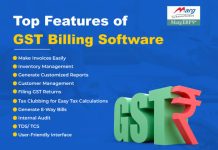Introduction
Goods and Services Tax (GST) is a unified tax system implemented in India to replace multiple indirect taxes. It is a destination-based tax levied on the supply of goods and services across states. GST has brought significant changes in the way businesses operate and manage their finances, including billing. In this blog, we will discuss the key aspects of GST billing in Mizoram, a northeastern state of India.
GST Registration in Mizoram
Any business with an annual turnover of more than Rs. 20 lakhs (Rs. 10 lakhs for businesses in special category states, including Mizoram) is required to register under GST. The process of GST registration in Mizoram is done online through the Goods and Services Tax Network (GSTN) portal. Once registered, the business is assigned a unique Goods and Services Tax Identification Number (GSTIN), which needs to be mentioned on all the invoices and bills issued by the business.
Types of GST Invoices
Under GST, there are various types of invoices that a registered taxpayer can issue, depending on the nature of the transaction. The common types of GST invoices are:
a) Tax Invoice: It is issued for the supply of taxable goods or services. It includes details such as the name, address, and GSTIN of the supplier and recipient, description and quantity of goods or services, rate of GST, and total value of the supply.
b) Bill of Supply: It is issued for the supply of exempted goods or services, or for a registered person opting for the composition scheme. It includes similar details as a tax invoice, except for the tax amount.
c) Receipt Voucher: It is issued when the supplier receives an advance payment for a supply to be made in the future. It includes details such as the name, address, and GSTIN of the supplier and recipient, description of the advance received, and the applicable GST rate.
d) Refund Voucher: It is issued when the supplier refunds any amount against a supply made earlier. It includes details such as the name, address, and GSTIN of the supplier and recipient, description of the supply for which the refund is made, and the applicable GST rate.
e) Revised Invoice: It is issued to correct any error or omission in a previously issued invoice. It includes details of the original invoice, along with the corrections made.
Mandatory Details in a GST Invoice
A GST invoice issued in Mizoram must contain the following mandatory details:
a) Name, address, and GSTIN of the supplier
b) Name, address, and GSTIN of the recipient (if registered)
c) Invoice number and date
d) Description of goods or services
e) HSN (Harmonized System of Nomenclature) code for goods or SAC (Services Accounting Code) for services
f) Quantity and unit of measurement
g) Total value of supply
h) Rate of GST and the amount of GST (CGST, SGST, or IGST)
i) Place of supply
j) Signature or digital signature of the supplier
Time of Issuing GST Invoice
As per the GST law, a GST invoice should be issued at the time of supply or before the time of supply. The time of supply varies based on the type of supply:
a) Goods: The time of supply is the earliest of the following: (i) date of issue of invoice, (ii) date of receipt of payment, or (iii) date of delivery of goods.
b) Services: The time of supply is the earliest of the following: (i) date of issue of invoice, (ii) date of receipt of payment, (iii) date of completion of service, (iv) date of receipt of advance payment, if any, or (v) the date on which the recipient of service records the same in his books of accounts.
GST Rates in Mizoram
GST rates in Mizoram are the same as applicable across India. The rates are categorized into five slabs, namely 0%, 5%, 12%, 18%, and 28%. Certain goods and services are exempted from GST, and some goods and services are taxed at a concessional rate under special categories. It is important for businesses in Mizoram to correctly determine the applicable GST rate for their goods or services to avoid any compliance issues in billing.
Invoicing in case of Reverse Charge Mechanism (RCM)
Under the Reverse Charge Mechanism (RCM), the liability to pay GST is shifted from the supplier to the recipient of goods or services. In such cases, the recipient is required to issue a self-invoice for the goods or services received and pay the applicable GST on the same. The self-invoice must contain all the mandatory details as mentioned earlier, along with the mention “Self-Invoice for Reverse Charge” to indicate that it is a self-invoice issued under RCM.
Bill of Entry for Imports
In case of imports, a Bill of Entry is required to be filed with the Customs department for clearance of goods. The Bill of Entry serves as an invoice for the goods imported and is considered as a valid document for claiming input tax credit (ITC) under GST. The Bill of Entry must contain details such as the name and address of the importer, description of goods, quantity, value, and applicable GST rate.
Record Keeping and Compliance
As per the GST law, businesses in Mizoram are required to maintain proper records of all invoices, bills, and other documents related to their business transactions for at least 6 years from the end of the financial year in which the transactions were undertaken. These records must be kept in a safe and accessible manner for scrutiny by the tax authorities. It is also important for businesses to comply with other GST requirements, such as filing regular GST returns, payment of GST dues, and reconciliation of invoices with the GST returns filed.
Conclusion
Proper billing and invoicing are crucial for businesses in Mizoram to comply with GST regulations and avoid any penalties or fines. It is important to understand the different types of invoices, mandatory details to be mentioned in a GST invoice, time of issuing invoices, and other compliance requirements. Businesses should also stay updated with the latest GST rates and amendments in the law to ensure accurate billing. Maintaining proper records and timely compliance with GST requirements will help businesses in Mizoram to smoothly manage their GST billing and ensure smooth operations in the GST regime.
Read more useful content:






